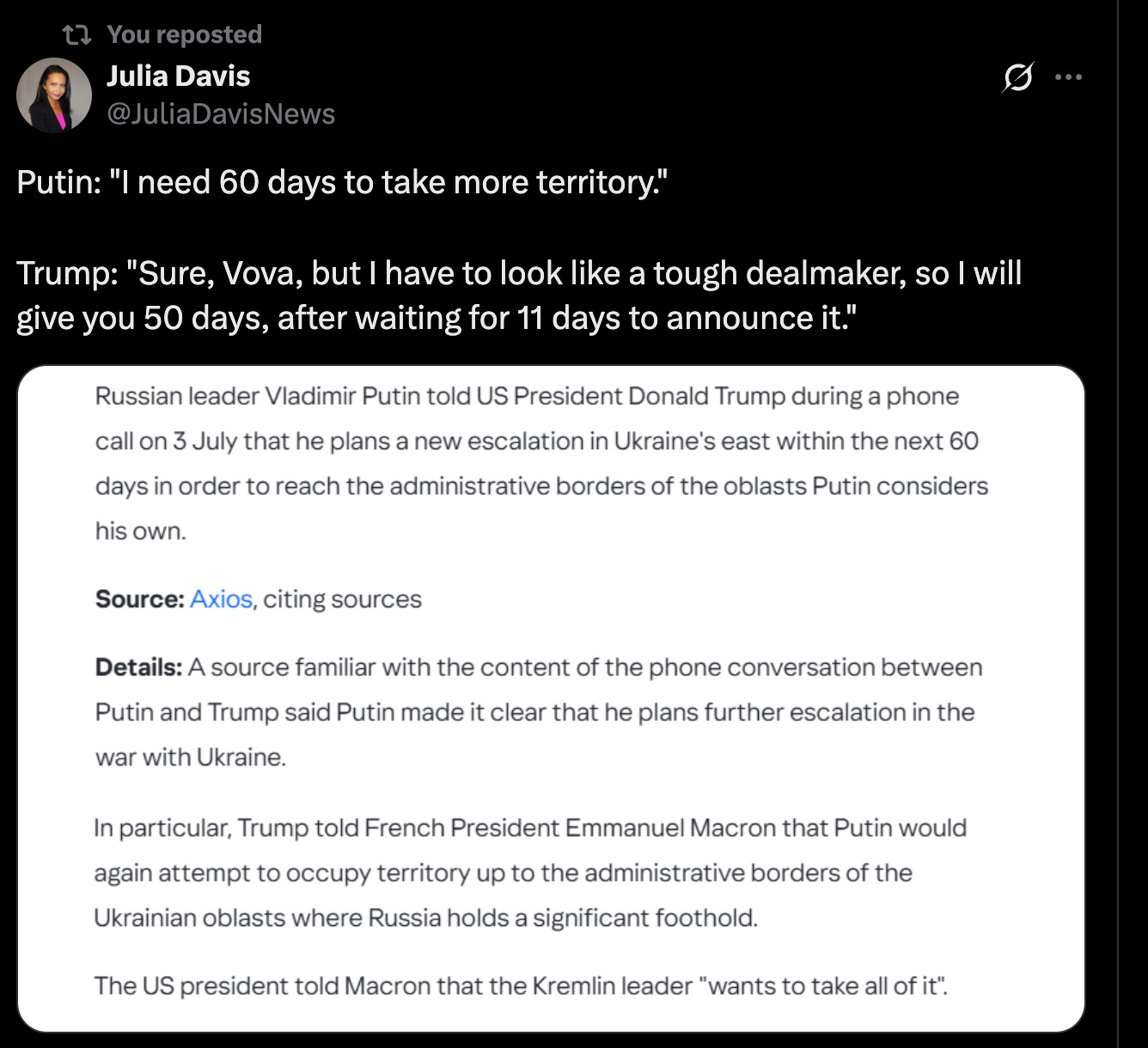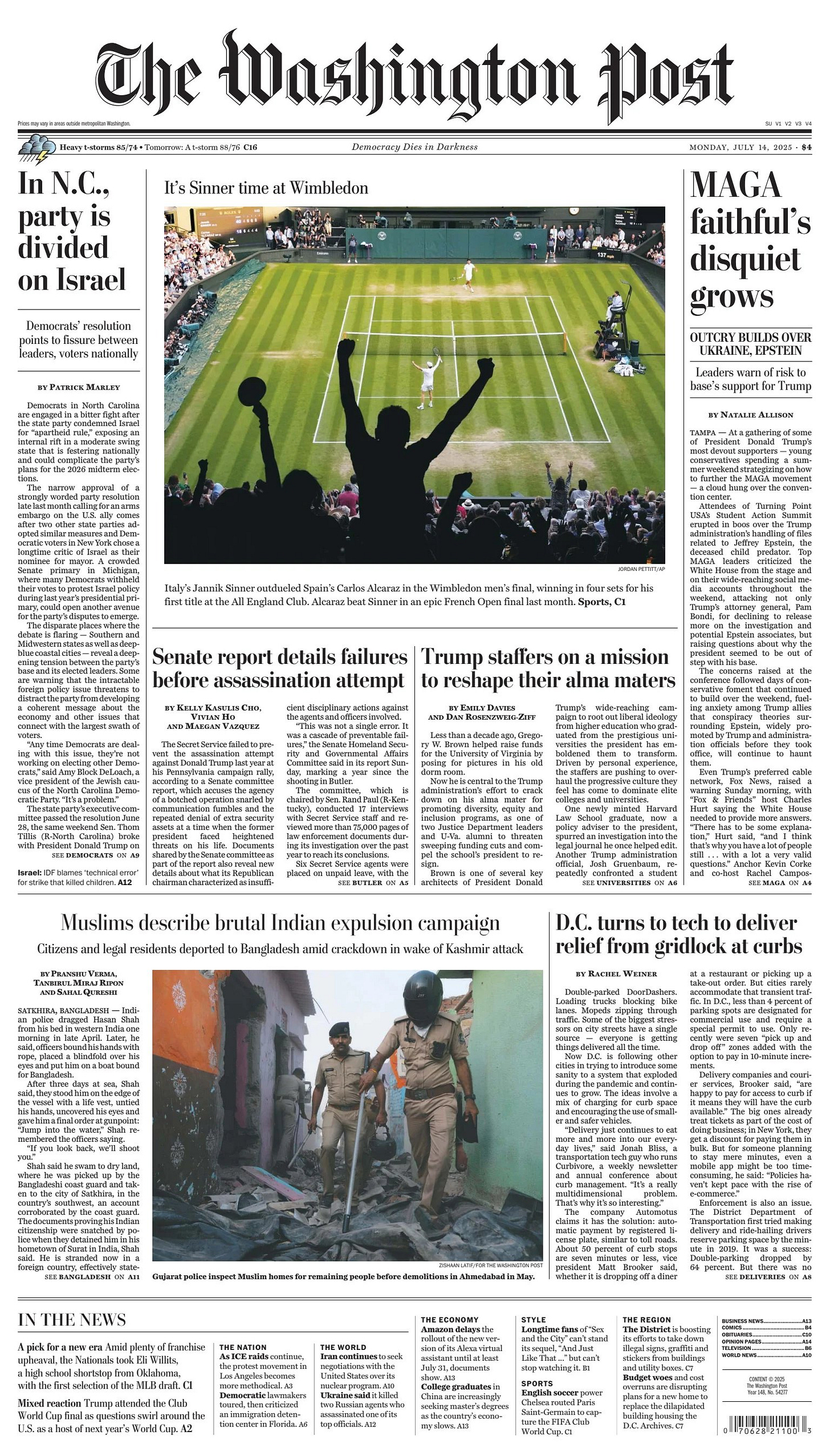Trump's 50-Day Ultimatum to Putin Raises Eyebrows in Kyiv and Cheers in Moscow
Despite tough talk on Russia and promises of new weapons for Ukraine, Trump’s vague timeline and lack of details spark skepticism — while the Kremlin signals satisfaction.
Donald Trump declared he is "very, very unhappy" with Russia and pledged to deliver “top-of-the-line” weapons to Ukraine through NATO. He also announced a potential 100% secondary tariff regime on countries that help Moscow circumvent sanctions — but only if a ceasefire deal is not reached within 50 days. The announcement came during a White House meeting with NATO Secretary General Mark Rutte, according to the BBC.
But beyond the rhetoric, the proposal lacked detail — no funding figures, no timeline for weapons deliveries, and no firm commitments. What raised further concern was the head-scratching 50-day grace period Trump is offering Vladimir Putin, especially in light of reports that Putin recently told Trump he needed 60 days to complete a major military escalation in Ukraine’s east. According to Axios, Putin said he planned to intensify operations to seize full control of the four partially occupied Ukrainian regions: Luhansk, Donetsk, Zaporizhzhia, and Kherson.
The BBC’s Frank Gardner noted that at the current rate of fire, Russia could launch up to 25,000 more drones and missiles at Ukraine during that window.
There were other tough options that were conspicuously absent. For instance, Trump could have moved to unfreeze the $8 billion in Russian Central Bank assets held in the United States and transfer them to Ukraine — a step that would have pressured European allies to act on the €180–190 billion they are still holding. He could have also granted Ukraine the authority to buy American weapons on credit or through direct loans. None of these actions were mentioned.
EU foreign policy chief Kaja Kallas cautiously welcomed the tougher tone, but warned: “Fifty days is a very long time — especially when innocent civilians are dying every single day.”
The Guardian’s Dan Sabbagh wrote: “In crude terms, any military package exceeding $10 billion would send a strong message to Moscow, especially when compared to the $67 billion previously delivered under President Biden.”
Meanwhile in Moscow, where officials had anticipated a more forceful pivot, the reaction was jubilant. The Moscow Stock Exchange surged to 2,700 points, and pro-Kremlin media gleefully dismissed Trump’s threats. “He has seven Fridays in a week,” one pro-war blogger scoffed, referencing a Russian idiom implying Trump is capricious and unreliable. “He could change his ‘opinion’ several times in the next 50 days.”
The “humanitarian city” Israel’s defence minister has proposed building on the ruins of Rafah would be a concentration camp, and forcing Palestinians inside would be ethnic cleansing, Israel’s former prime minister Ehud Olmert has told the Guardian. Israel was already committing war crimes in Gaza and the West Bank, Olmert said, and construction of the camp would mark an escalation. “It is a concentration camp. I am sorry,” he said, when asked about the plans laid out by Israel Katz last week. Once inside, Palestinians would not be allowed to leave, except to go to other countries, Katz said. Katz has ordered the military to start drawing up operational plans for construction of the “humanitarian city” on the ruins of southern Gaza, to house initially 600,000 people and eventually the entire Palestinian population. “If they [Palestinians] will be deported into the new ‘humanitarian city’, then you can say that this is part of an ethnic cleansing. It hasn’t yet happened,” Olmert said. That would be “the inevitable interpretation” of any attempt to create a camp for hundreds of thousands of people, he said. Olmert did not consider Israel’s current campaign was ethnic cleansing because, he said, evacuating civilians to protect them from fighting was legal under international law, and Palestinians had returned to areas where military operations had finished. The “humanitarian city” project is backed by Israel’s prime minister, Benjamin Netanyahu, and Israel’s refusal to withdraw from the area Katz envisages for the camp is a sticking point in the faltering negotiations for a ceasefire deal, Israeli media have reported. Olmert said that after months of violent rhetoric, including calls from ministers to “cleanse” Gaza and projects to build Israeli settlements there, government claims that the “humanitarian city” aimed to protect Palestinians were not credible.
The 27-member EU bloc has begun targeting Chinese companies it believes are responsible for the “undermining of Ukrainian territorial integrity and sovereignty.” In its latest sanctions package, it is looking to slap asset freezes and visa bans on one Chinese businessman for repeatedly transferring goods made in the EU to Russia while those goods were subject to EU export restrictions. Two Chinese companies are also targeted for selling all-terrain vehicles (ATVs), infrared detectors, and other optical components to the Russian armed forces for use in Ukraine. Speaking to Current Time, Russian political scientist Natalia Shevshkova noted comments from Chinese Foreign Minister Wang Yi after his recent European tour were a sign that Beijing has “grown bolder” in its rhetoric to where "it’s no longer Eastern diplomacy, but rather outright, almost rude behavior….China understands that if Putin is now allowed to recognize -- if he's allowed to keep Crimea, if the Western community is ready to negotiate and leave some territories with Putin, then China’s hands are untied too,” Shevshkova said - RFE/RL
President Zelensky said Monday that he would seek to replace the country’s prime minister, a major government shake-up that comes amid battlefield setbacks and a souring mood in the country. Mr. Zelensky said in a post on Facebook that he would nominate Yulia Svyrydenko, who is now serving as a first deputy prime minister and had played a prominent role in negotiating a natural resources deal with the Trump administration. She would replace Denys Shmyhal, who has held the position since 2020 and was in office when Russia invaded. The move, which would be the highest-level government shuffle since Russia’s invasion more than three years ago, needs to be approved by a vote of Parliament, where Mr. Zelensky’s party has a majority. Recent polls suggest growing pessimism in Ukraine about the war with Russia, a shift from earlier in the conflict, when most Ukrainians voiced optimism that their country would prevail. Mr. Zelensky’s political opponents questioned whether replacing the prime minister with a deputy actually constituted change, saying that the move was instead intended to install a loyalist and further consolidate the power of the president, already sweeping under martial law. Accusations have been mounting in Ukraine that Mr. Zelensky is abusing the martial law authority that was granted on the first day of the Russian invasion and has been in effect since, and intensified after some elected mayors were replaced with military administrators - NYT
China has unveiled its stealth carrier jet program, revealing not only cutting-edge warplanes but a bold bid to redefine naval power in the Indo-Pacific. This month, the South China Morning Post (SCMP) reported that China publicly revealed the production facilities of its fifth-generation stealth fighter jets for the first time, signaling progress toward deploying these aircraft on its third aircraft carrier. During a broadcast by state-run CCTV, at least two J-35 jets were observed at Shenyang Aircraft Corporation’s (SAC) hangar, even though the report focused on the J-15T, an upgraded 4.5-generation carrier-capable fighter. Military analyst Song Zhongping said the J-35s were likely corrosion-resistant, carrier-based variants, marking the first public indication of their mass production. Both aircraft are expected to operate from the Type 003 aircraft carrier Fujian, currently undergoing sea trials and set for commissioning by year-end. Sun Cong, chief J-15 designer, highlighted software-defined functionality as key to faster aircraft development - Asia Times
Cambodia's Prime Minister Hun Manet said on Monday that his country will implement military conscription starting next year, in an announcement that coincides with ongoing border tensions with Thailand. Relations between the neighbours have deteriorated sharply following an armed confrontation on 28 May in which one Cambodian soldier was killed in one of several small contested patches of land. The sides have agreed to de-escalate their dispute to avoid further clashes, but continue to implement or threaten measures that have kept tensions high, alongside exchanging sharp words. The dispute has also roiled Thailand's domestic politics - Euronews
France's first lady has taken her case against two women over claims she used to be man to the highest appeals court after a lower court let them off, her lawyer said Monday. On Thursday, the Paris appeals court overturned earlier convictions against the two women for spreading false claims – that went viral online – that Brigitte Macron, 72, used to be a man. Disinformation on Macron's gender has circulated on social media for years. Her 24-year age difference with President Emmanuel Macron has also attracted much comment. Brigitte Macron filed a libel complaint against the two women after they posted a YouTube video in December 2021, alleging she had once been a man named Jean-Michel Trogneux – who is actually Brigitte Macron's brother. In the video, defendant Amandine Roy, a self-proclaimed spiritual medium, interviewed Natacha Rey, a self-described independent journalist, for four hours on her YouTube channel. Rey spoke about the "state lie" and "scam" she claimed to have uncovered that Jean-Michel Trogneux had changed gender to become Brigitte, and then married the future president. The claim went viral, including among conspiracy theorists in the United States. A lower court in September last year had ordered the two women to pay €8,000 in damages to Brigitte Macron, and €5,000 to her brother - France 24/AFP






